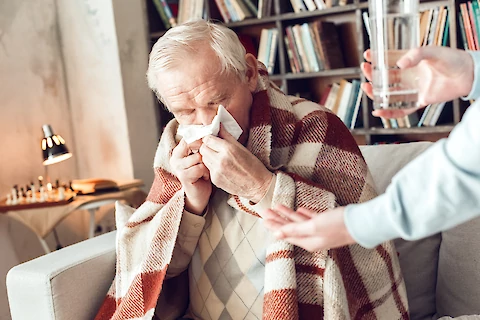
As flu season approaches, family caregivers of senior loved ones need to be prepared. The implications of the flu can be more severe for seniors, making prevention and proper care crucial. This guide will provide a comprehensive overview of key strategies to implement, such as ensuring vaccinations are up-to-date, maintaining a clean living environment, and fostering good personal hygiene practices. The aim is to equip caregivers with the necessary tools and knowledge to protect their loved ones during flu season, ensuring their safety and well-being. Let's dive in and explore how best to navigate the winter months when our elderly relatives may be the most vulnerable.
Importance of Vaccinations
Influenza can pose a significant threat to seniors due to their weakened immune systems. This makes it vitally important that vaccinations are up-to-date. The annual flu shot is a primary line of defense for seniors, reducing the risk of hospitalization and severe complications. Coordinate with health professionals to ensure your loved ones receive their flu shots in a timely manner, usually in the fall before the onset of flu season.
Maintaining Clean Surroundings
A tidy and clean environment is another key component in preventing the flu. The influenza virus can survive on surfaces for up to 24 hours, making frequent cleaning essential during flu season. Pay particular attention to high-touch surfaces like door handles, remote controls, and kitchen appliances. Regularly laundering bedding and towels can also help limit the potential spread of the virus.
Implementing Personal Hygiene Practices
Good personal hygiene practices are an effective way to prevent the spread of the flu virus. Encourage seniors to wash their hands frequently, especially before meals and after using the bathroom. If soap and water are not readily available, an alcohol-based hand sanitizer can be used. Remind seniors to avoid touching their faces as much as possible to decrease the chance of ingesting the flu virus.
Recognizing Flu Symptoms in Seniors
Quickly recognizing flu symptoms can lead to prompt treatment and speedier recovery. Common symptoms include fever, cough, sore throat, muscle aches, and fatigue. Unlike a common cold, flu symptoms tend to come on abruptly. It's even more crucial for seniors as they are at a higher risk of developing complications such as pneumonia. If you notice any of these symptoms, seek medical care promptly.
Stocking Essential Supplies
Stay prepared by ensuring you have the necessary supplies at home, including over-the-counter medicines, tissues, hand sanitizer, and disinfectant cleaning products. Having these items on hand allows you to respond quickly and effectively should flu symptoms appear. Start gathering these supplies well before the winter months, the peak time for flu spreading.
Work With Senior Helpers Corvallis
The role of a caregiver can be challenging, but with these strategies in place, you can provide the best possible care for your senior loved ones during flu season. Staying prepared and proactive can help ensure the health and well-being of those you care for. For any help or further assistance in preparing for flu season, don't hesitate to contact us at Senior Helpers Corvallis. Our team of qualified professionals is dedicated to providing comprehensive care for seniors in Corvallis, Salem, Albany, Lebanon, Monmouth, and nearby. We're here to support you through flu season and beyond.